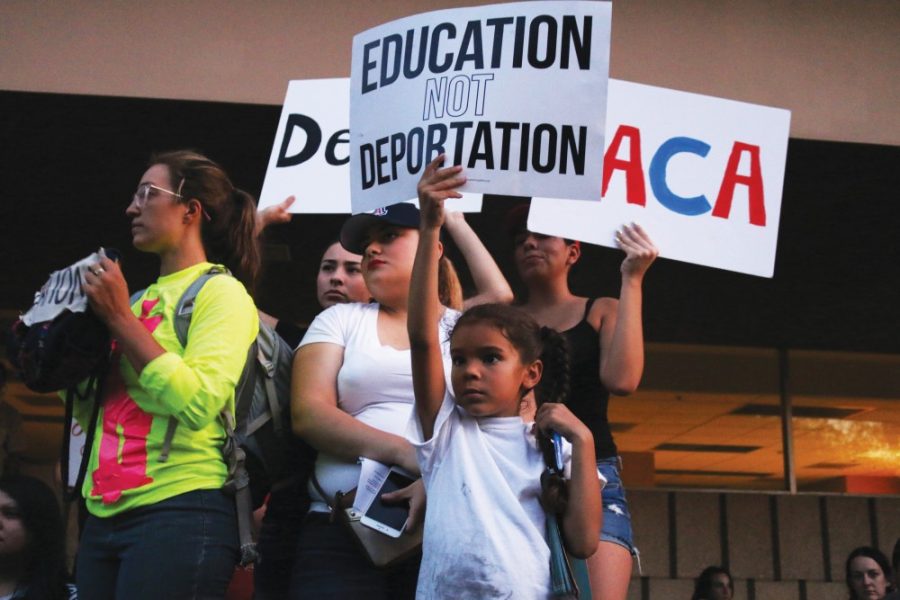DACA Past and Future
In Sept 2017, President Donald Trump ended DACA, or Deferred Action for Childhood Arrivals, an Obama-era program that gave undocumented immigrant recipients, who arrived in the United States as children and met a number of other requirements, the ability to apply for and renew a two-year period of freedom from deportation.
“DACA granted work permits and relief from deportation to folks who qualified based on very selective requirements,” said Darío Andrade Mendoza, UA alumnus, DACA recipient and communication co-director for Scholarships A-Z.
These requirements included being under 31 years of age as of June 2012, residing in the U.S. since June 2007, having no criminal background and currently being in school or being a graduate of high school, according to the information from the U.S. Citizenship and Immigration Services.
RELATED: OPINION: If people vote, Arizona could go blue
DACA recipients also pay federal taxes, but they are not entitled to government welfare benefits, such as Social Security or Food Stamps.
After signing the executive order ending the program, Trump called on Congress to create legislation to resolve the status of those in the DACA program in the long term. Attempts by Democrats to revitalize the DREAM Act, which would give DACA recipients a potential path to US citizenship, have gone nowhere.
With the Trump administration resolved to phase out DACA recipient protections, the clock is ticking for Congress to either step in or risk the potential deportation of thousands of DACA recipients, many of them students or United States armed service members.
“DACA’s future is really unclear at the moment,” said Andrew Silverman, UA professor of Immigration Law. “There needs to be some permanent solution that Congress enacts and the President signs.”
The uncertainty created by the Trump administration’s policy and Congressional inaction extend all the way to the University of Arizona, where around 50 DACA recipients are enrolled to earn a college degree. As the November midterm elections approach, questions about the status of DACA recipients have been revisited as politicians lay out their campaign promises.
“The country clearly has an obligation to try to do something to give Dreamers a permanent status in this country,” said Silverman. “They were brought here by their parents and grew up in the US. Many of them only know the US. Many of them have very little or no connections to their country. They really are Americans in many ways. This is really their country.”
Republican and Democrats alike largely agree that Dreamers positively contribute to the country and should not be sent back to places they know nothing about. The parties’s approaches to a solution to end the uncertainty of Dreamers’s status differ and oftentimes have clashed with the larger immigration debate galvanizing election campaigns this cycle.
The next Congress, no matter its political makeup, will be forced to reckon with the uncertainty of DACA recipients and their status in this country, with decisive legislation.
UA and Access to Higher Education
The uncertainty created by the national debate over the legal status of the DACA recipients has threatened their access to higher education. National politics has local effects that stretch all the way to Tucson.
“When President Obama created the executive order that created DACA, it helped students attend the UA,” said Matthew Rein, Associated Students of the University of Arizona Executive Vice President. “Having DACA students is an immense part of our campus and culture and they are important to the University of Arizona community.”
ASUA believes in inclusiveness for all UA students and wants to help DACA students pursue their education at UA.
RELATED: How and where to vote
“We have students who were DACA recipients and rely on that program in order to navigate their college journey,” said Natalynn Masters, ASUA President.
In this time of obscurity for the future of current DACA recipients, Master stressed the importance of ensuring that all students are welcome to continue and complete their educational paths.
“ASUA is the student government so we represent the needs of all students. We will continue to serve, engage and empower DACA students,” said Masters. “We are working to help provide whatever support they need. We are here to help ensure that DACA students are getting the education they came to the University of Arizona to receive.”
Follow Lauren Albrecht on Twitter









